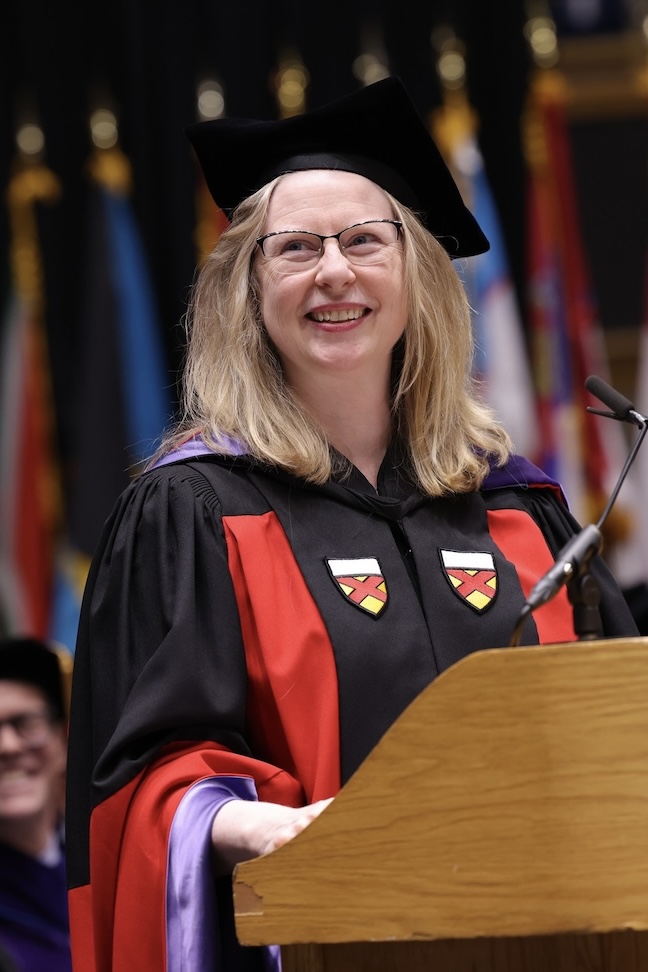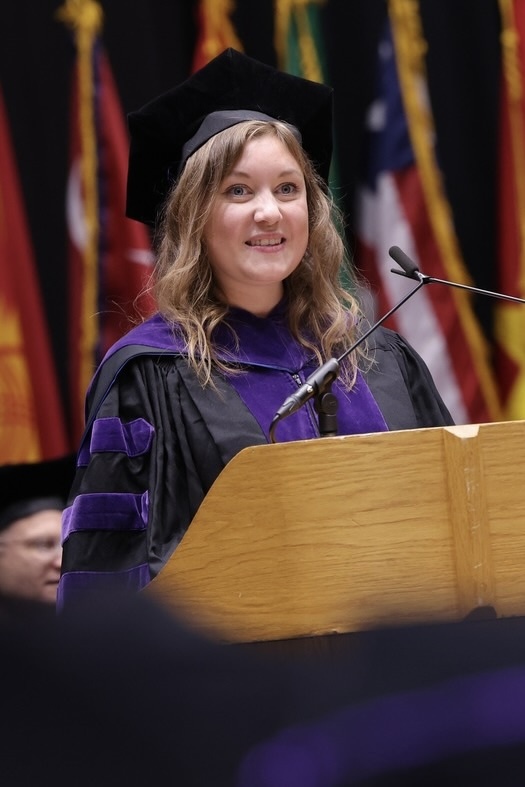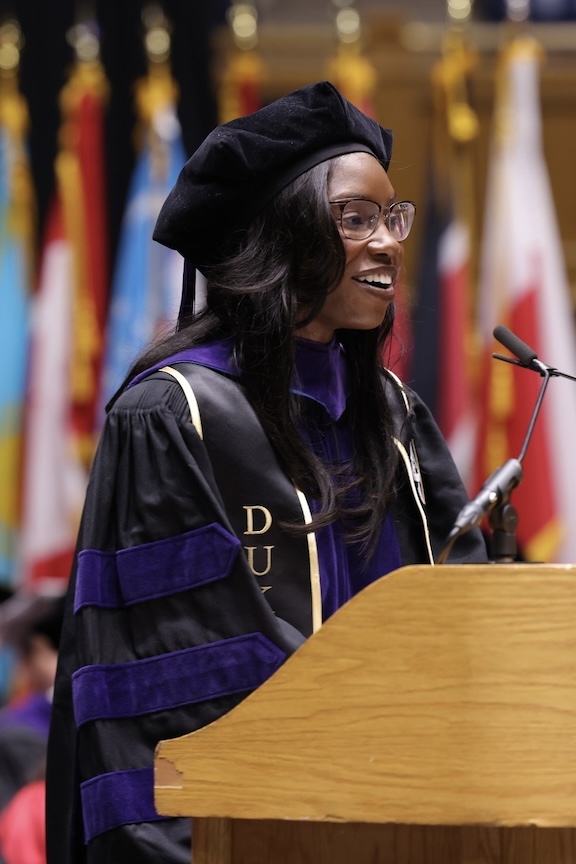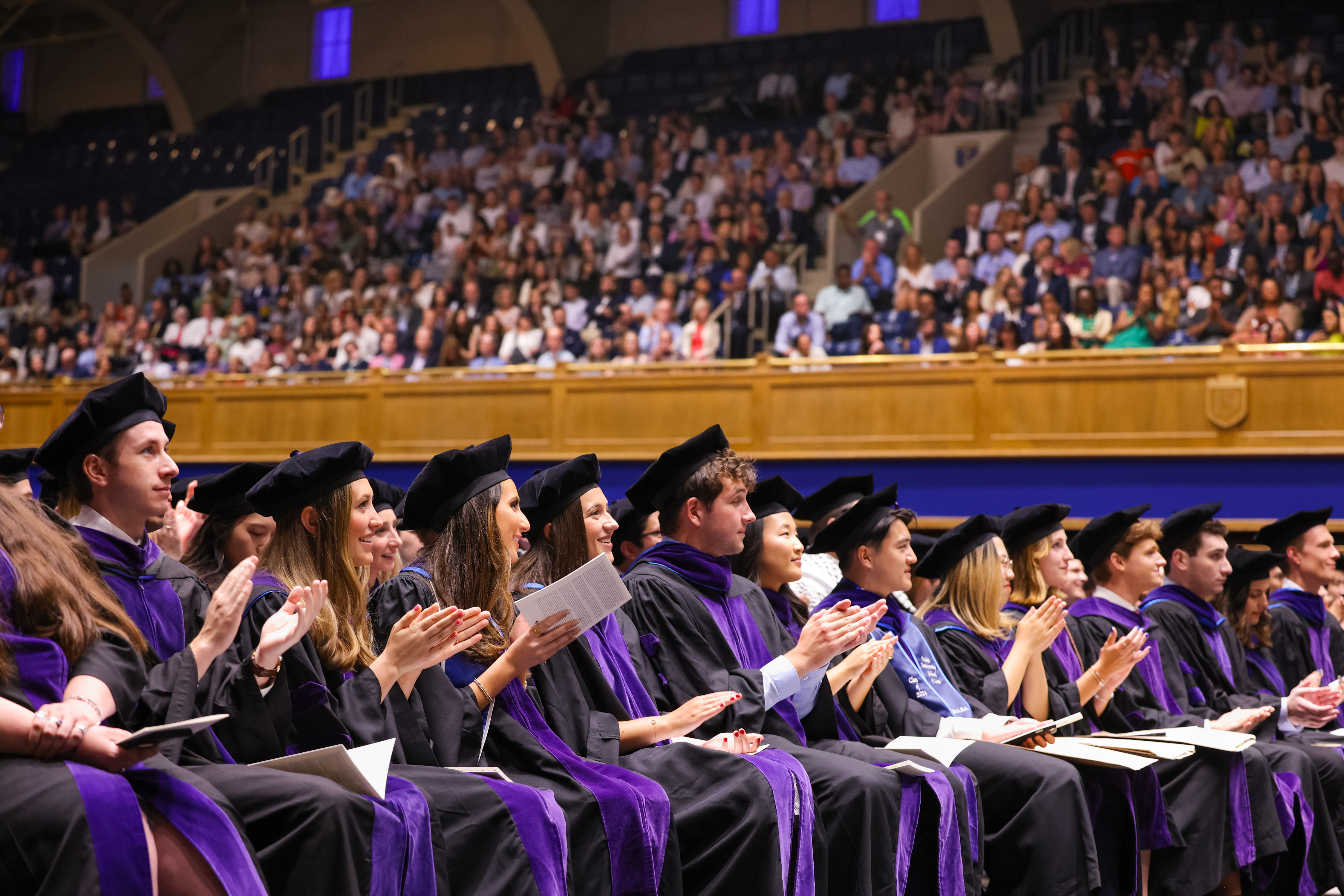Class of 2024 celebrates their graduation from Duke Law School
Distinguished speaker Christopher Schroeder, longtime faculty member and former head of the Office of Legal Counsel, advised graduates to stay focused on their integrity and responsibilities at Saturday's Convocation ceremony.
 Professor Emeritus Chris Schroeder
Professor Emeritus Chris Schroeder
Convocation speaker Christopher H. Schroeder, a longtime faculty member who served in high-level positions at the Department of Justice, including leading the Office of Legal Counsel and its Office of Legal Policy, told the Class of 2024 on Saturday that his opportunities came from both luck and remaining focused on personal integrity and professional responsibilities.
“I absorbed that lesson from so many colleagues in government, including three outstanding attorneys general, but it is a lesson that is entirely transportable wherever your work takes you,” Schroeder said.
“Also transportable are the words of Louis Pasteur, ‘Fortune rewards the prepared mind.’ I have been blessed to work with people who also maintained the highest levels of competence.”
Schroeder, the Charles S. Murphy Professor Emeritus of Law and professor emeritus of public policy, was distinguished speaker at the May 11 ceremony in Cameron Indoor Stadium honoring the members of the Class of 2024.
Of the 279 JD graduates, 20 also earned a Master of Laws, or LLM, in international and comparative law, and 10 also received an LLM in law and entrepreneurship. Six JD graduates also earned a graduate degree from another department or school at Duke University. Thirty-one JD graduates received the Public Interest and Public Service Law certificate.
Eighty-four graduates of law schools in other countries received their LLM degree. One graduating student, Juliana Bortolini Bolzani, received the Doctor of Juridical Science (SJD), the highest degree in law.
The Convocation ceremony was livestreamed and can be replayed on Duke Law’s YouTube channel.
“As Duke Law alumni, you will all have the opportunity to join the many graduates of this institution who use their power as lawyers to effect critical change in the world,” James B. Duke and Benjamin N. Duke Dean and Professor of Law Kerry Abrams told the class in her opening remarks.
“Whether this is your first law degree or your second (or even third), you will have an obligation, wherever your career takes you, to serve your community and help those who are less fortunate, as so many of our alumni do. And you will have a responsibility to uphold the tenets and traditions of the legal profession and the rule of law for all people, even when doing so does not serve your personal interests.
“This is what it means to be a lawyer, and it makes me so proud that you have all chosen to be members of this profession.”
Schroeder says opportunities find the prepared mind
Schroeder, who is married to A. Kenneth Pye Professor Emerita of Law and former dean Kate Bartlett, joined the Duke Law faculty in 1979 and taught Property, as well as courses on Congress, federal policymaking, environmental law, and cybersecurity, among others. In 1998, he founded the Program in Public Law, now the Richard A. Horvitz Program in Constitutional & Public Law, to promote an understanding of public institutions, the Constitutional framework in which they function, and the principles and laws that apply to the work of public officials. He retired from teaching in 2020.
Schroeder’s academic career was punctuated by several high-level terms in government service. Early on, he was called to advise the Senate Judiciary Committee, and then-Senator Joe Biden, on judicial nominees and served as chief counsel to the judiciary committee from July 1992 to February 1993. In spring 1993 he joined the Office of Legal Counsel (OLC) and led the office as deputy assistant attorney general from April 1995 until January 1997.

Schroeder returned to Washington in 2010 as assistant attorney general in the Office of Legal Policy (OLP), where he advised the attorney general and the White House for nearly three years on a variety of law enforcement and national security issues and supervised the evaluation of then-President Barack Obama’s nominees to the federal judiciary.
He returned to the Duke Law faculty from late 2012 until the 2020 presidential election, when he was tapped to lead the DOJ agency review team for the Biden-Harris transition and retired from teaching. In October 2021 he was appointed by President Joe Biden as assistant attorney general for the OLC. On his retirement from that position in July 2023, Schroeder was presented with the Edmund J. Randolph Award, the DOJ’s highest honor, by Attorney General Merrick Garland in recognition of outstanding contributions over his career.
Addressing the graduates, Schroeder spoke about how he balanced his academic career at Duke with public service, and how those opportunities carried the weighty responsibility of advising the highest levels of government, including the executive branch, on legal matters.
He said his first call to Washington, in 1987, came "out of the blue" from a friend of a friend, and happened to coincide with a sabbatical opportunity from Duke Law. Schroeder was charged with helping to evaluate the nomination of Judge Robert Bork, who had been tapped by then-president Ronald Reagan to succeed retiring justice Lewis F. Powell, Jr.
“These hearings would become the most contentious in decades, maybe ever, and they completely swallowed up my sabbatical, but they also opened up an entirely new set of opportunities — something I did not fully realize at the time,” Schroeder recalled. “After the Bork hearings, extended confirmations, and contested confirmations, became the norm — for better or worse.”
In the ensuing years, he said, he would be asked to serve during the nominations and hearings to replace several retiring justices. It was grueling work, he said, in the pressure cooker of Senate confirmation hearings.
“It is very hard to overemphasize the role of luck in opening up further opportunities for me, most of which were also equally unexpected,” he said. “In this particular case, I knew someone who knew someone who just happened to be looking for part-time assistance from someone who had some amount of expertise in reading and evaluating law review articles at just the moment I happened to have a sabbatical coming up, and just happened to work for an employer — Duke University — who took seriously its stated commitment that the knowledge it helped to generate should be put to public service.”
That helped lead to the next opportunity, as position of deputy in the OLC under Walter E. Dellinger III, the Douglas B. Maggs Professor Emeritus of Law, who died in 2022. There Schroeder would advise then-president Bill Clinton, along with Professor of Law H. Jefferson Powell.
Nearly a decade later, he said, “lightning struck again” when he was tapped to head the OLP during the Obama-Biden administration, and then once again in 2021, when president-elect Biden nominated him to run the OLC.

“Following in Walter’s footsteps was a thrill for me, although the seriousness of advising the president and the attorney general was pretty daunting. Hard work was still the watchword. The range of issues I’ve been privileged to work on while at the Department of Justice have been somewhat head-spinning,” Schroeder said.
They included advising the executive branch on issues including whether a proposed counter-terrorism operation overseas was legal, what actions the president could lawfully take if Congress failed to raise the statutory debt ceiling, and what could be done legally about mysterious balloons floating over Montana that might have been sent by China. They also included advising on questions of immunity for former close aides of former presidents, as well as questions on executive privilege applied to former presidents.
“Our stated responsibility was to advise the president and other members of the executive branch on what the law allowed them to do, rather than to rubber-stamp what they had already decided to do,” Schroeder said. “I took that responsibility seriously and just as importantly, was surrounded by other lawyers, both career and politically appointed, who were equally serious about it.”
Whether or not graduates pursue public service also, Schroeder said, he had two pieces of advice to offer.
“Number one: expect the unexpectable. A big part of life is luck," he said.
"Number two: Maintain your high standards, your integrity, and your professionalism. Then when the first thing happens, the second thing will mean that you are ready for the opportunity. Wherever the next chapter of your life takes you, best of luck and congratulations.”
Class speakers reflect on personal growth and friendships
International LLM class speaker Cathrine Rohde Kjaergaard, an attorney from Denmark who earned her first law degree from Aarhus University, recalled that she spent her first days in Durham watching raging thunderstorms from a hotel window and wondering if coming to Duke was a good decision.
She then recounted how she and her classmates, who hail from 37 different countries, built the foundation for lifelong friendships over the past year, celebrating birthdays, marriages, parenthood, travel, outings, meals and, of course, long days in the library together.
“Through it all, we also shared our challenges. We leaned on each other and we supported each other when our days were filled with thunderstorms. We shared encouragement, trust, compassion, and hugs when we needed them,” Kjaergaard said.
“As we graduate here today, and we go on to pursue our individual goals, I hope that we will remember that our friendships do not depend on how often we meet or how often we talk. They are rooted in the bonds we have built.

“Earning the Duke Law LLM Degree is not only about the diploma and the extraordinary academic achievements. It is also about the journey we shared. Let our shared journey continue to inspire and unite us wherever we go from here. This was a good decision.”
Kjaergaard earned the Certificate in Business Law with her LLM degree and plans to sit for the Texas bar.
JD class speaker Esosa Gloria Asemota said her three years of law school had been “full of discovery and surprise.” A graduate of the University of North Carolina – Chapel Hill, Asemota said she hadn’t originally planned on law school, but came to it after “a derailment” that forced her to rethink her path.
“Here, in the context of this law school community, I’ve learned that integrity is about more than just morality. It is also about making the active, courageous decision to be yourself,” Asemota said. “It’s about being who you actually are, instead of trying to be someone else that looks good, or maybe even is good, but that ultimately isn’t you.
“The path to integrity comes not from picking and choosing the aspects of yourself that you like and denying the rest but rather, it’s about engaging honestly with every single part of you, so you can exist in the world as a whole person.
“It is in this place of honesty that you will develop – you will find yourself. And you’ll see that the person you are is indeed better than whatever ‘you’ you were trying to manufacture.”
Asemota closed with a quote from Adam Young: ‘The most creative endeavor one can undertake is the endeavor to become oneself. The greatest gift you can give to God and to others … is the gift of becoming you.’ So do that, please.”
At Duke Law, Asemota served as the internal vice president of the Black Law Students Association and the social chair of the Duke Law Music Association. She was also a member of the Tricky Dick comedy sketch club and the Dean’s Advisory Council. Asemota plans to work in the New York office of Freshfields.
Justin Miller Awards announced
Abrams also presented the 2024 Justin Miller Awards, given to JD graduates in the categories of leadership, integrity, citizenship, and intellectual curiosity, and to one outstanding LLM student.
- Leadership: Josh Britt and Caira Watson
- Integrity: Morgan Kelleher, Margaret Kruzner, and Luke Mears
- Citizenship: Esosa Asemota, George Khoury, and Lucy Walton
- Intellectual Curiosity: Miranda Campbell Kerrigan and George Werner
- LLM Award for Leadership and Community Participation: Nick Opoku
Following speeches, the graduates were received by Abrams, Clinical Professor of Law Jeff Ward, Associate Professor of Law Emilie Aguirre, Associate Dean for International Studies Oleg Kobelev, and Assistant Dean for Student Affairs Lewis Hutchison.
Abrams closed the program by wishing the class a fulfilling career in the law and urging them to return often and maintain a strong connection with their professors, classmates, and the next generations of Duke Law students.
See more photos from Convocation 2024.
